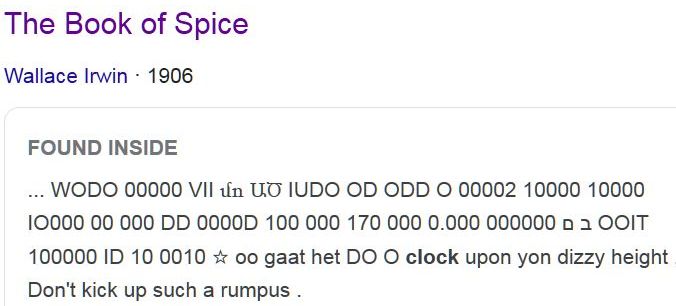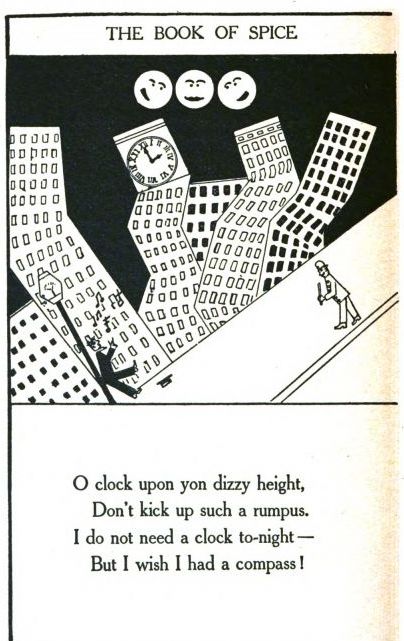Friday, January 01, 2021
Odd little jackpot
Short on sleep, I decided to delve into old books for a bit of sanity as usual. Combining the two hashtags in previous item,
defensible thymes + defensible times = SPICE CLOCK.
Try SPICE CLOCK in Google Books.
= = = = =
First, a little 1893 schoolbook called 'Geographical Spice', aimed at teachers who wanted to spice up their lessons with fascinating bits. Many of these bits are similar to the historical oddities dramatized by Hix or MacHarrie.
One item matched and improved a Hix piece that had caught my full attention earlier.
 WTF? Why would a 1906 author write a combination of glossolalia, Roman numerals, Thai characters, Dutch words, binary digits, and Hebrew, and then a sentence in plain English?
Here's the underlying page:
WTF? Why would a 1906 author write a combination of glossolalia, Roman numerals, Thai characters, Dutch words, binary digits, and Hebrew, and then a sentence in plain English?
Here's the underlying page:
 Google's AI decided the squared-off crude sketch was text, turned its "eyes" 45 degrees leftward to match the rows of "letters", and tried to interpret it as text. Pretty smart in a mechanical way.
The title page of the book:
Google's AI decided the squared-off crude sketch was text, turned its "eyes" 45 degrees leftward to match the rows of "letters", and tried to interpret it as text. Pretty smart in a mechanical way.
The title page of the book:
 Note that the 1906 librarian filled in the author's real name. Human librarians knew what they were doing.
Most of the book is equally awful art combined with some wise sayings that couldn't be said now:
Note that the 1906 librarian filled in the author's real name. Human librarians knew what they were doing.
Most of the book is equally awful art combined with some wise sayings that couldn't be said now:

MYSTERIOUS MUSIC FROM THE SEA. Pascagoula, in Mississippi, on the Louisville Rail road, is one of the few places in the world where one can hear in the lonely night-time a weird, sad music from the sea; not the music of washing waves and singing sands, but a monotonous hum, which naturalists say comes from a vast multitude of fish of the drum species; although visitors of a poetical turn of mind prefer to attribute this mysterious music to the sighs of mermaids and the wild wails of spirits of the deep.Hix didn't know or didn't mention that naturalists had explained the music. He called it mysterious, most likely because his source did. Hix didn't let drama interfere with facts when known. I thought I was COOL! I thought I was getting ahead of the old inadequate knowledge when I cited modern observations of fish songs. Nope, the 1893 naturalists already knew what was happening. Another item is interesting in a similar way:
Almost everyone has heard of the blind fish of Mammoth Cave, Kentucky, but not so much has been said about the blind rats of that cavern. The rats are quite numerous but very timid. They are of a bluish color, with white abdomen, neck, and feet. Their hair is very soft, and they have large, brilliant, sightless eyes, destitute of an iris. These rats have never been known to visit the upper world. Agassiz held the opinion that they were created with a structure adapted to their home, although some physiologists are of the opinion that the rats found here were not originally blind, but having found their way into the cave at last lost their vision.Note again the DUAL SYSTEMS, the proper respect for both real and Darwin views. Couldn't happen now. = = = = = The second book that popped up on SPICE CLOCK was just plain fucking weird. The Book of Spice, 1906, Wallace Irwin, has nothing at all to do with spice. Here's the sample text that showed in Google:
 WTF? Why would a 1906 author write a combination of glossolalia, Roman numerals, Thai characters, Dutch words, binary digits, and Hebrew, and then a sentence in plain English?
Here's the underlying page:
WTF? Why would a 1906 author write a combination of glossolalia, Roman numerals, Thai characters, Dutch words, binary digits, and Hebrew, and then a sentence in plain English?
Here's the underlying page:
 Google's AI decided the squared-off crude sketch was text, turned its "eyes" 45 degrees leftward to match the rows of "letters", and tried to interpret it as text. Pretty smart in a mechanical way.
The title page of the book:
Google's AI decided the squared-off crude sketch was text, turned its "eyes" 45 degrees leftward to match the rows of "letters", and tried to interpret it as text. Pretty smart in a mechanical way.
The title page of the book:
 Note that the 1906 librarian filled in the author's real name. Human librarians knew what they were doing.
Most of the book is equally awful art combined with some wise sayings that couldn't be said now:
Note that the 1906 librarian filled in the author's real name. Human librarians knew what they were doing.
Most of the book is equally awful art combined with some wise sayings that couldn't be said now:

Labels: Bemusement, Entertainment
